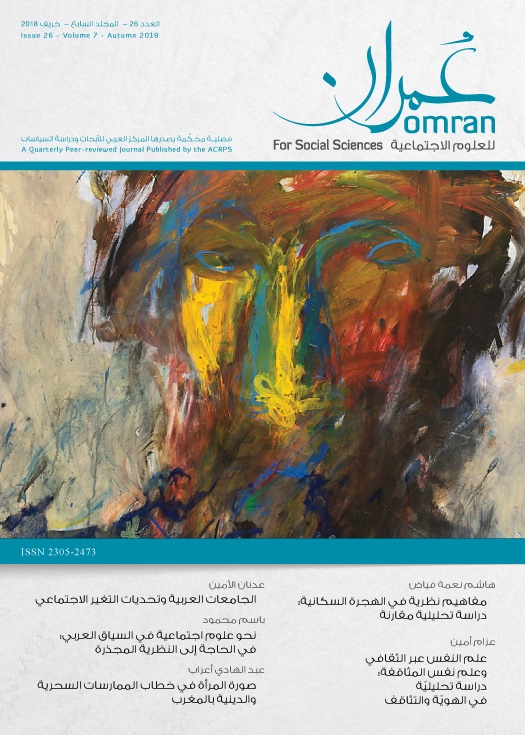
The Arab Center for Research and Policy Studies has published the 26th issue (Autumn 2018) of its quarterly peer-reviewed journal Omran, dedicated to the social sciences and humanities. This edition offers a variety of studies on migration, cultural psychology, Arab university education and protest movements, as well as anthropological research on popular culture in Morocco.
The first research paper is a theoretical study by the researcher specializing in population geography Hashim Nimah Fayad, which explores the evolution of theories and concepts of population migration during the last hundred years. In his article entitled “Theoretical Concepts in Population Migration: A Comparative Analytical Study”, Fayad made a comparative theoretical effort to address the evolution of research on international migration and the relevance of this topic in Arab countries. This issue also includes two descriptive theoretical studies. Azzam al-Amin, professor of social psychology at the Doha Institute for Graduate Studies, presented his study of “Cross-cultural Psychology and Psychology of Acculturation: Analytical Study of Identity and Acculturation”. He presented a descriptive theoretical study of cross-cultural psychology and psychology of acculturation, while attempting to combine theories of identity strategies and acculturation strategies.
Bassem Mahmoud, a doctoral candidate at the Institute of Sociology at the Free University of Berlin sought with his paper “Towards Social Sciences in the Arab Context: The Need for Grounded Theory”, to produce social knowledge stemming from an Arab sociological foundation. Educational sciences professor at the Lebanese University and president of the Lebanese Association for Educational Sciences, Adnan Amin, conducted a critical study into the governance of higher education. In his article entitled “Arab Universities and the Challenges of Social Change,” Amin concluded that the governance of Arab universities falls within what might be called the political model, which limits academic freedoms and marginalizes the social sciences and humanities faculties.
Anthropologist Abdelhadi Arabe examined the reasons for the spread of popular miracle-working practices among rural women in Morocco. In his article “The Image of Women in the Discourse of Miracle and Religious Practices in Morocco”, he noted that Moroccan rural women dominate the world of popular magic in response to male dominance of the world of popular religion. Female magical practice in Arabe’s opinion is thus a response to popular folk religion.
This issue also published an article of “Social Movements and Protest in Transitional Contexts” by Moroccan sociologist Abderrahmane Rachik, in which he monitored the transition from violent to peaceful protest in a number of Arab cities. This instalment also included two book reviews; Shady Lewis offers his commentary on Copts and the Security State: Violence, Coercion, and Sectarianism in Contemporary Egypt by Laure Guirguis, while Mohammed Meziane reviews Vegetarian Morocco: 15th-18th Century, History and Biology by Mohamed Houbaida.
Finally, Mona Abdelhady concludes the 26th edition of Omran with her review of the BP Energy Outlook 2018. The paintings of Qatari artist Ibtisam Al-Saffar, which portray the diversity of human faces in different contexts were selected for display in this issue.